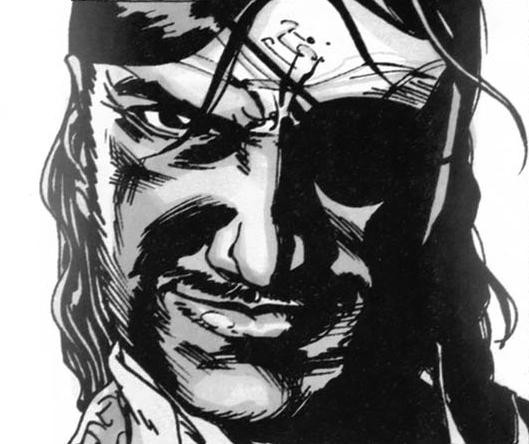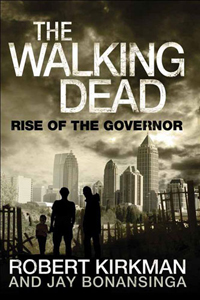Robert Kirkman’s The Walking Dead franchise is a smash hit. The comics dropped in 2003 to great acclaim and still continue to rake in the dough. In 2010, it picked up an Eisner for Best Continuing Series, and 88 issues later it’s still one of the highest selling monthly comics. The TV series took off like gangbusters as well. With 5.3 million people tuning in for the premiere episode, and 6 million for the finale, it became the most watched basic cable series ever in the 18-49 demo, all but guaranteeing it a second season. They even plan on breaking into the video game market this winter.
Today, Kirkman upped the ante by teaming with horror writer Jay Bonansinga at St. Martin’s Press to release the novel The Walking Dead: Rise of the Governor.
By painting the zombie crisis with broad strokes, Rise manages to stay in canon by avoiding mentioning the canon at all. Which makes it perfect for fans of the comics who hunger for a background on one of the greatest comic book villans of all time and fans of the TV show who are sick of hearing comic book geeks go on and on about that Governor dude and what’s so cool about him anyway? The Governor is cool. Very, terrifyingly, sickeningly, horrifyingly cool. The Governor makes Patrick Bateman look like Rainbow Dash, and no, I’m not exaggerating. At all. He’s not an emotionless killing machine or an amoral murderer. He’s a sadistic psychopathic pervert who knows exactly what he’s doing and why, and takes utter pleasure from all the pain he inflicts. Basically, it’s the worst thing you’ve ever read, and if you haven’t read it then pick up The Walking Dead issues #2530 (volume 5/book 3). Today. Now. Do it. I’ll wait.
Done? Good. Now, let’s get down to brass tacks. On the craft side, this book is sometimes good, sometimes awful, and most of the time relatively harmless. Much of the story involves varying degrees of Philip and Brian Blake, Philly’s young daughter Penny, and their sidekicks failing to drive around Georgia, squatting in abandoned homes, and yelling at each other and everyone they come into contact with. The text is clipped and terse, matching the sparsity of Kirkman’s dialogue in the comics, but sprinkled with $5 words to make the book sound more important than it really is. I assume that’s Bonansinga’s influence—though since I’ve never read anything else by him I wouldn’t swear to it in court—but it makes the text come off disjointed and clunky. When I’m reading about a guy nailgunning zombies I don’t want to feel like I’m taking the SATs. I also don’t understand the decision to break the book into three sections. The divisions seem almost arbitrary, as if the guys did a google search for quotes about the violent nature of mankind and couldn’t figure out how else to get them in the book. But neither detracts from the story as a whole, so they’re rather minor quibbles.
The bigger problem I have with this book is its blatant misogyny. Let me preface this rant by cautioning you to take this with a grain of salt. I’m still fuming from DC’s disgraceful and offensive attitude towards Starfire and Catwoman, and that’s left me rather touchy about how women are portrayed in the literary/comic mediums. Actually, ‘touchy’ is probably not the right word. I think ‘stark raving mad’ and ‘want to stab people in the face with spoons’ are more apropos. Where once I might have been more forgiving of such behavior, right now I’m ready to start throwing things, so my sensitivity to this topic is pretty raw.
There are no women in Rise. True, there are female characters in the story, but they are little more than window dressing. They lack in personality or opinion except as defined by the men around them. They aren’t actors but plot points. Even poor little Penny isn’t anything but a prop to drive a wedge between the Blake brothers and their associates. (To be fair, all of the characters, even the leads, exist mostly as two-dimensional plot points. No one will ever accuse Kirkman and Bonansinga of creating characters that are too realistic.) Men make decisions, have adventures, and plan attacks, while the women are hidden in closets, abused, berated, and shoved around as much as the Biters are. Men are defenders and offenders; women are victims. The book is full of Loris without nary a Michonne to be seen.
The comics use violence as a means to an end. It’s rarely gratuitious and usually serves as social commentary on human nature and morality. Rise doesn’t even try to wax philosophical on the outbreak and the violence that ensues, and without that intelligence framing it, the violence ‘ especially against women ‘ becomes exploitative and degrading. It eventually got to the point that I skipped whole chapters because I simply couldn’t read about rape anymore. Something as vicious as that shouldn’t be a plot point, and defining the act in terms of how it affected the men while disregarding any impact it had on the women who suffered through it is a horrid way to tell a story.
*steps off soap box*
 When I was able to put all that aside, I managed to enjoy the story. Kirkman and Bonansinga have crafted a chilling story detailing the collapse of an American family, and it’s not nearly as heartwarming as what happens to the Grimes’. The book is thrilling and frightening like any good horror story should be, though outside the context of The Walking Dead mythos it serves little purpose.
When I was able to put all that aside, I managed to enjoy the story. Kirkman and Bonansinga have crafted a chilling story detailing the collapse of an American family, and it’s not nearly as heartwarming as what happens to the Grimes’. The book is thrilling and frightening like any good horror story should be, though outside the context of The Walking Dead mythos it serves little purpose.
As nail-biting as the tale is, ultimately it’s just fan service. That’s not necessarily a bad thing, but I can’t honestly see anyone unfamiliar with either the comics or the show being interested enough to buy it in the first place. The typically Kirkman twist at the end is a full meal for those who’ve read the comics, a Happy Meal for those savoring the TV show, and some totally unfamiliar foreign snackfood made from unidentifyable ingredients for everyone else. If you’re looking for a gateway to the series, you’d be hard pressed to pick a worse entry point than Rise of the Governor, but if you’re in on the joke this makes a tidy bit of filler until the new season starts on Sunday.
Alex Brown is an archivist by passion, reference librarian by profession, writer by moonlight, and all around geek who watches entirely too much TV. She is prone to collecting out-of-print copies of books by Evelyn Waugh, Jane Austen, and Douglas Adams, probably knows far too much about pop culture than is healthy, and thinks her rats Hywel and Odd are the cutest things ever to exist in the whole of eternity. You can follow her on Twitter if you dare.










